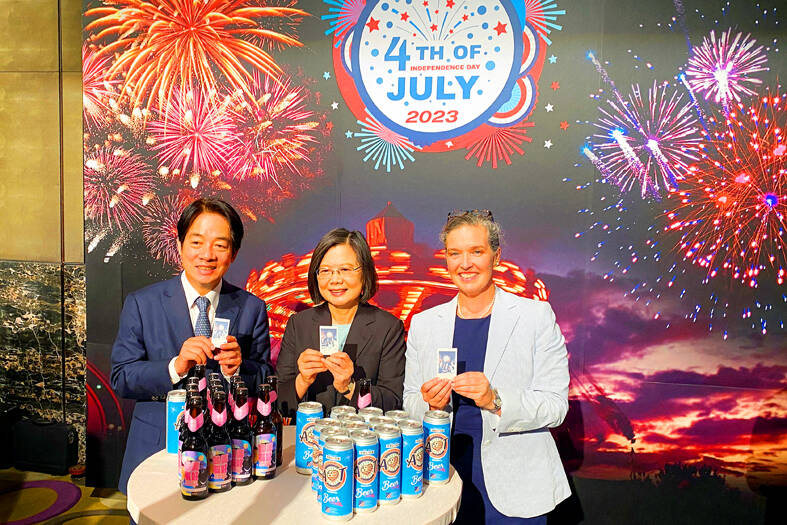The US has deep respect for Taiwan’s democracy and is committed to supporting its self-defense, even in the face of loud complaints from Beijing, American Institute in Taiwan (AIT) Chair Laura Rosenberger said on Thursday.
US “interest in peace and stability across the Strait and our commitments to supporting Taiwan’s self-defense capacity are things we will continue to uphold,” Rosenberger said during a media discussion at AIT’s Washington headquarters.
She was responding to a question about the recent approval of US$440 million in arms sales to Taiwan, the 10th by US President Joe Biden’s administration.

Photo: CNA
“Any complaints from Beijing are not going to change that approach,” she said.
In May, US Secretary of Defense Lloyd Austin confirmed at a Senate hearing that the US would also soon send Taiwan US$500 million in stockpiled military equipment using the presidential drawdown authority (PDA), but nothing has been formally announced so far.
The PDA option was brought into play to help Taiwan get access to weapons quickly amid delays in US deliveries of arms ordered by Taiwan, with reports putting the backlog at US$19 billion of weapons.

Photo: Ben Blanchard, Reuters
Asked if the lack of action was due to US Secretary of State Antony Blinken’s recent trip to China, Rosenberger said she did not have anything specific on the PDA beyond what Austin said before Congress.
Rosenberger also spoke briefly about her trip to Taiwan last month, when she met Taiwan’s presidential candidates and some of their advisers.
“I’ve really valued the opportunity to get to know them, to understand better each of their policies and their priorities, and to really build relationships with each of the candidates,” she said.
Rosenberger rejected the idea that the conversations with the candidates were “interviews” designed to assess their policies, as some have suggested.
“I’d actually just like to make really clear that that’s not at all the purpose of these conversations,” she said, adding that US policy is “not going to change based on which candidate is in office.”
On the topic of double tax avoidance, she said it is an issue that is very high on the radar of policymakers in Washington, as well as for Tsai and her colleagues.
“There are efforts to explore what might be possible,” she said, but added that she did not have anything specific at this time.
Meanwhile, in Taipei, Tsai told a US Independence Day celebration that Taiwan’s close partnership with the US would continue to grow no matter who becomes the next leader of Taiwan.
Speaking at the reception on Thursday hosted by the AIT, Tsai said the enduring relationship between the two nations was planted decades ago “when the US supported Taiwanese people in pursuing democracy.”
“Since then, and at every critical juncture of Taiwan’s political history, the United States was always there to lend assistance and encouragement to Taiwan,” she said.
Bilateral investment is also increasing at an unprecedented rate, Tsai said, adding that this cooperation has helped provide the world with reliable and secure supply chains.
Since she assumed office in May 2016, Tsai said Taiwan and the US have done “quite a lot together and the results have been remarkable.”
“This partnership will continue to grow no matter who the next president of Taiwan is,” she said.
Tsai appealed to the three presidential candidates who joined Thursday’s reception — Vice President William Lai (賴清德) of the Democratic Progressive Party (DPP), New Taipei City Mayor Hou You-yi (侯友宜) of the Chinese Nationalist Party (KMT) and former Taipei mayor Ko Wen-je (柯文哲) of the Taiwan People’s Party.
“I’m sure all the presidential candidates who are here tonight would agree with me without hesitation. Do you want to raise your hands and say yes?” she said, eliciting good-natured laughter from the crowd.
AIT Director Sandra Oudkirk said in her address that the Washington-Taipei partnership is closer than ever, pointing to how bilateral trade increased by nearly 20 percent last year.
She also thanked Tsai for working with her on strengthening and expanding US-Taiwan relations since she took up the post in July 2021.
“Your commitment to ensuring the peace and prosperity of Taiwan is constant, and the United States appreciates your steady leadership in the face of an increasingly complex geopolitical climate,” she said.
Thursday’s reception marked the first time Tsai attended the reception in person since assuming office in May 2016. In July 2016, she delivered a pre-recorded address.
The reception was also attended by a delegation of visiting US Republican representatives who were on a five-day visit that began on Monday.

The CIA has a message for Chinese government officials worried about their place in Chinese President Xi Jinping’s (習近平) government: Come work with us. The agency released two Mandarin-language videos on social media on Thursday inviting disgruntled officials to contact the CIA. The recruitment videos posted on YouTube and X racked up more than 5 million views combined in their first day. The outreach comes as CIA Director John Ratcliffe has vowed to boost the agency’s use of intelligence from human sources and its focus on China, which has recently targeted US officials with its own espionage operations. The videos are “aimed at

STEADFAST FRIEND: The bills encourage increased Taiwan-US engagement and address China’s distortion of UN Resolution 2758 to isolate Taiwan internationally The Presidential Office yesterday thanked the US House of Representatives for unanimously passing two Taiwan-related bills highlighting its solid support for Taiwan’s democracy and global participation, and for deepening bilateral relations. One of the bills, the Taiwan Assurance Implementation Act, requires the US Department of State to periodically review its guidelines for engagement with Taiwan, and report to the US Congress on the guidelines and plans to lift self-imposed limitations on US-Taiwan engagement. The other bill is the Taiwan International Solidarity Act, which clarifies that UN Resolution 2758 does not address the issue of the representation of Taiwan or its people in

US Indo-Pacific Commander Admiral Samuel Paparo on Friday expressed concern over the rate at which China is diversifying its military exercises, the Financial Times (FT) reported on Saturday. “The rates of change on the depth and breadth of their exercises is the one non-linear effect that I’ve seen in the last year that wakes me up at night or keeps me up at night,” Paparo was quoted by FT as saying while attending the annual Sedona Forum at the McCain Institute in Arizona. Paparo also expressed concern over the speed with which China was expanding its military. While the US

SHIFT: Taiwan’s better-than-expected first-quarter GDP and signs of weakness in the US have driven global capital back to emerging markets, the central bank head said The central bank yesterday blamed market speculation for the steep rise in the local currency, and urged exporters and financial institutions to stay calm and stop panic sell-offs to avoid hurting their own profitability. The nation’s top monetary policymaker said that it would step in, if necessary, to maintain order and stability in the foreign exchange market. The remarks came as the NT dollar yesterday closed up NT$0.919 to NT$30.145 against the US dollar in Taipei trading, after rising as high as NT$29.59 in intraday trading. The local currency has surged 5.85 percent against the greenback over the past two sessions, central